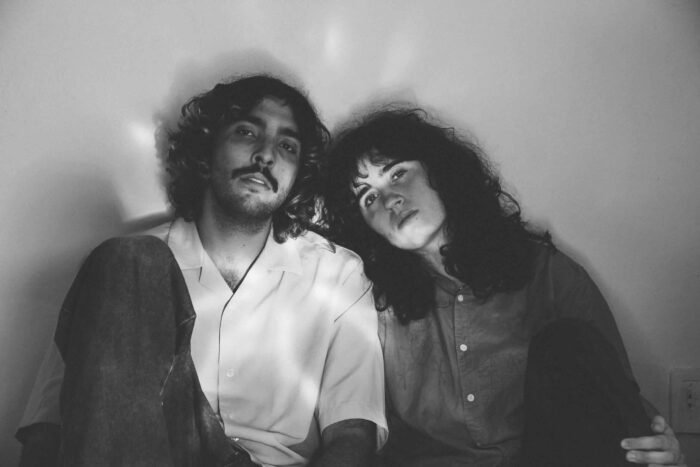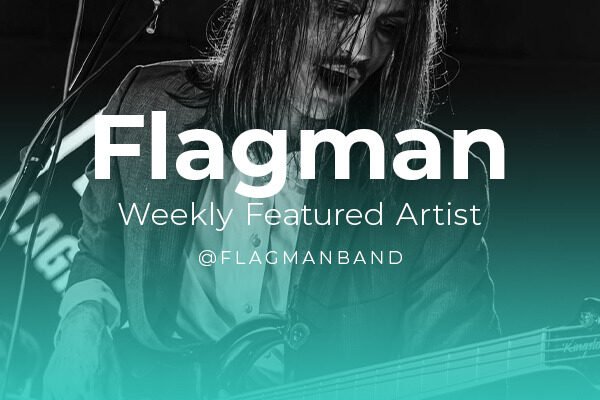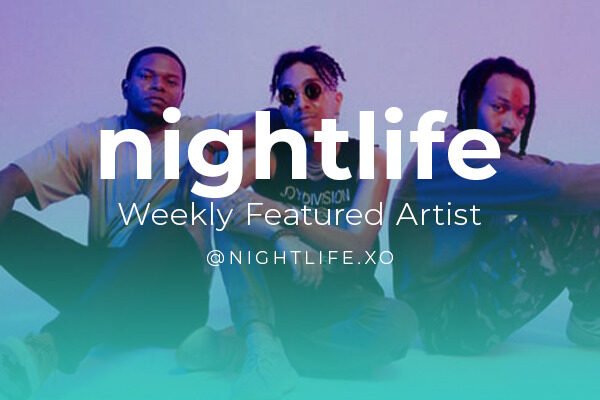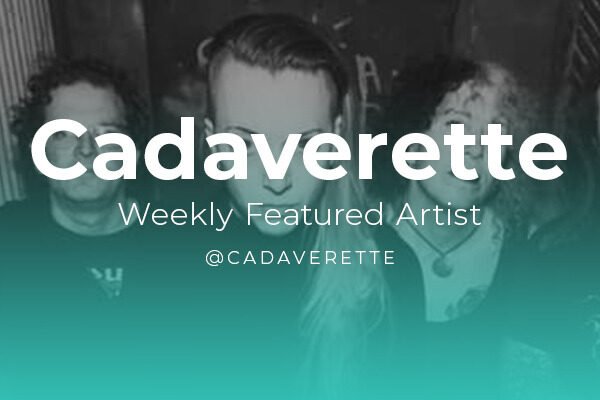The new album from Brazilian artists Sophia Chablau and Felipe Vaqueiro is a journey through the country’s musical past and present—if not its future. Handycam, released last month by Selo Risco, is a propulsive, eclectic mix of songs that seem to stand on an Earth whose foundation isn’t always solid. The tracks twist and shift sonically, yet still leave room for melodies that stick like mud to the bottom of a shoe. They aren’t easy to shake off, and each one carries its own sense of urgency that demands multiple listens. In other words, when people talk about ‘earworms,’ Handycam is a veritable clew of them.
And in case you didn’t know what a clew is (full disclosure: neither did I), it’s the collective noun for ‘worms.’ A murder of crows, a pride of lions, a flamboyance of flamingos, language has a way of creating its own poetry through sound. As someone who has spent the past two decades living in countries where I didn’t speak the language, I’ve become acutely aware of how the sounds we string together can drift through the air as part of a greater symphony of communication. Perhaps the literal meaning gets lost, but the music remains—and in some ways, that’s just as powerful.
My first real fascination with Chablau and Vaqueiro’s work began with this use of language. Handycam’s eleven tracks are bookended by two songs in English—a deliberate creative choice that offers a glimpse into the vast and richly woven tapestry these two artists are working from. According to Vaqueiro,
‘Music communicates even when the lyrics aren’t understood, but the expansion of meaning that happens when you do understand what’s being sung is immense. Writing in English is both an aesthetic exercise — exploring the phonetics, sounds, and structures of each language — and a way to try to broaden the potential reach of our message, since English is still one of the most spoken languages in the world. It’s also important to understand that even when we use English, we embed in it our very own way of using the language. Entering that field of symbolic dispute matters — okay, we do write in English, but it’s going to be in our own way.‘
On the album’s opening song, the brilliant “Lungs full of air”, Chablau flirts with the similarities between ‘word’ and ‘world’ while lamenting the loss of a close friend. There’s a beauty in not just the lyrics, but how the consonants and vowels work together to create something that’s greater than the narrative being told. ‘The world is so close, my foot‘ she sings. ‘The word is so close to my lips‘. There’s an acknowledgement that all of these disparate parts of our bodies work together, even if sometimes that doesn’t make sense. The body, as Chablau said in a recent Instagram post, is indeed just a trampoline for the mind.
Chablau’s own connection with language is a reflective one, and encapsulates the cross-cultural beauty the album captures:
‘I once joked that we speak Brazilian English — or maybe post-English. We’re constantly surrounded by a huge amount of English words and objects, especially because of our relationship with our North American neighbors. And I think it’s important to know how to handle those images somehow, because our understanding of English is very particular, very Brazilian. There are things we say in English that make no sense in the language itself but make total sense in Portuguese — like saying ‘I have 25 years,’ because that’s how we say it in Portuguese. Also, the idea that in English there’s no distinction between to be (ser) and to be (estar) (temporarily) is very curious to me — in Portuguese, things can be or be for now. There’s something beautiful in that nuance, something that doesn’t happen in English, and it’s fascinating to play with the idea that, in English, everything simply is.‘
This idea of post-English is a fascinating one, really, because it reminds us that music—(and I’ll resist calling it the ‘international language’)—is, in many ways, the post-language of humanity. Having immersed myself in Brazilian music since moving here a year ago, though still a novice in the language, I’ve come to hear the merging of consonants, vowels, enunciations, and pronunciations as just another instrument within the beautiful cacophony. And Brazilian music, perhaps more than that of any other country on the planet, has a singular way of blending all these sounds into gloriously chaotic, exhilarating compositions. Chablau and Vaqueiro are both products of that rich legacy:
‘We’re like a patchwork quilt of anachronistic references — I think our post-internet generation carries that fate. We absorb so much music from different times and places all at once. That alone makes our sound inherently hybrid, as these different techniques and languages overlap and reveal new shades of already familiar colors. In the end, I bring along Novos Baianos with Velvet Underground and Mdou Moctar, Baden Powell and Kiko Dinucci with King Gizzard and The Beatles, and so on. The same love I have for sampling, I have for the agogô.‘
Vaqueiro’s list of influences is about as apt a description of what he and Chablau have achieved together on Handycam as any. There’s the psychedelic raunchiness of Novos Baianos, and the slow love affair with noise that began with The Velvet Underground and found new life through King Gizzard & the Lizard Wizard. Beatles-esque melodies are sprinkled throughout the album, alongside intricate guitar work that evokes the spirit of Baden Powell. And on “Cinema brasileiro”, the band sounds as if they’ve relocated to Toronto to join Broken Social Scene and Neko Case. It’s a thrilling display of versatility and creative spirit.
Chablau takes talk of ‘influences’ even one step further:
‘It’s kind of crazy to talk about references sometimes, because there are sounds that just come naturally from our bodies. What we look for in sound has a lot to do with what’s already inside us. Living in Brazil is itself a huge reference throughout the album — there are things that might sound strange to people elsewhere, but for us, that’s just how music ‘stands on its own feet.’ I love sonic madness — I get absolutely obsessed with moments when I can no longer understand what’s happening in the music with my head. I feel that a lot of contemporary work I’ve heard influenced the album’s sound — like the work of Anthony Sahyoun, Sandy Chamoun, and Jad Atoui in GHADR. Even if it sounds completely different, there’s a beautiful essence of freedom in their music that I wanted to bring into ours. I’ve been obsessed with Lebanese experimental music lately — experimental music from anywhere can liberate my mind. I love hearing freedom in any language — because, in the end, it feels like it has no homeland.’
Chablau is not one to shy away from speaking truth to power. At the show I saw recently, she performed draped in a keffiyeh. Her Instagram posts often shed light on the injustices her own people face, and Handycam addresses many of these injustices head on (even if I don’t know what it all means). The plight of the Palestinian people, as the world has finally seen unravel over the past two genocidal years, is a mirror by which all of our collective failures are reflected. Freedom, as she says, has no homeland.
‘I believe that the struggle of a people for their freedom is — or at least should be — a struggle for all of humanity. It’s that old saying: we will only be free when everyone is free. There is no such thing as a ‘regionalization of freedom,’ where in some places people have legitimate living conditions while in others there is a constant struggle for the most basic survival. It’s clear that in unequal systems like capitalism, the freedom of some comes at the expense of the exploitation and repression of others, in an uneven and interconnected way across the planet. I never lived in Europe, but I’ve been there a few times to perform, and when I set foot on that territory I could understand which side my country stands on in the balance of global inequalities.
‘I think that gave me an even deeper sense of solidarity with the countries of the Global South. Each has its own specificity and richness, but they also face very similar and deeply rooted problems. It’s wild to think that military technology, weapons, drones, economic attacks, harsh economic measures, and dictatorships are all directed at our peoples — and that all of them are part of a political project organized by the same powers.
‘Israeli weapons that kill Black youth in the outskirts of our cities, coups financed by the United States, invasions by land, air, and sea by the same countries that once colonized us. I have a degree in geography, haha, so I think realizing how deeply connected the world is — and that we must build a sense of unity among the working people of the world, especially in the Global South — has become a kind of flag in my heart.
‘And I think the keffiyeh is a symbol of a people’s resistance that encourages all of us to resist too, all around this world — as well as an act of declaring which side we stand on, and that we will not forget anyone in this immense struggle.‘
The true power of Sophia Chablau and Felipe Vaqueiro’s music lies in the fact that the story they’re telling comes from a perspective outside the dominant Western narrative. The recognition that one’s suffering is not experienced in isolation takes on an even greater sense of urgency when considering the artists’ diverse backgrounds. Vaqueiro hails from the coastal city of Salvador, while Chablau grew up in a middle-class family in São Paulo. Aware of her relative privilege in a country where inequity is often strikingly visible, and working alongside a collaborator who comes from a very different part of this immensely diverse nation, the two have created music that bridges their worlds with empathy and imagination.
At the end of the day, however, Handycam is simply a great collection of songs that show the creative depth and artistic risk-taking that these two artists have. If the album serves as a showcase to what can be done when humans finally act as if we are all part of the same tribe, then that’s just another cherry on top of the global pie. In the end, we’re much more than just a gaggle of geese, an armoury of aardvarks or a sounder of hogs. The only collective noun that should really matter is ‘humanity’, and Sophia Chablau and Felipe Vaqueiro‘s collaboration brings us one step closer to understanding that beautiful realization.
You can follow Sophia Chablau on her Instagram, as well as Felipe Vaqueiro on his. Handycam was released on Selo Risco on October 1st, 2025 and can be purchased via their Bandcamp.
Handycam musicians:
Sophia Chablau – guitars and vocals
Felipe Vaqueiro – guitars and vocals
Marcelo Cabral – bass
Biel Basile – drums
Fabio Tagliaferri – viola







